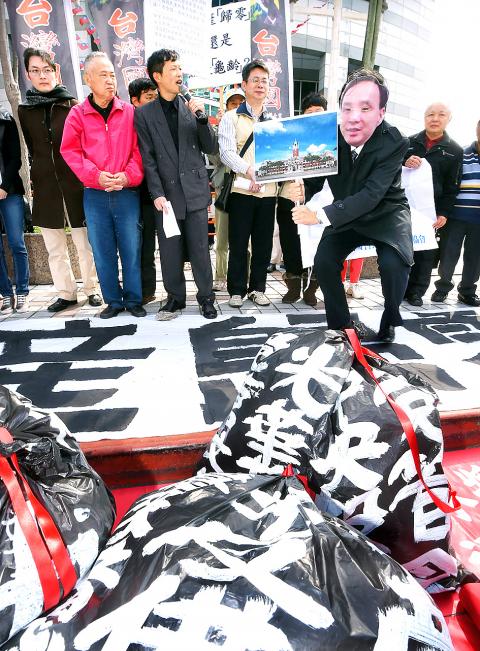Despite the assertion by Vice President Wu Den-yih (吳敦義), when he was acting chairman of the Chinese Nationalist Party (KMT), that all of the party’s assets were acquired through legitimate means, KMT Chairman Eric Chu (朱立倫) yesterday asked for an investigation of the issue, which is to be conducted by “impartial” public figures.
At the first meeting of the KMT’s Central Standing Committee since his inauguration as chairman on Monday, Chu, who is also mayor of New Taipei City, said he has commissioned Jennifer Wang (王如玄), a lawyer and a former Council of Labor Affairs minister, and KMT Legislator Liao Cheng-ching (廖正井) to form a team of party members known for their impartiality and professionalism to look into the assets issue.
The team is to go through documents related to the party’s assets and its financial status and produce a report, an idea that had been suggested to Chu throughout his campaign for chairman, he said.

Photo: Fang Pin-chao, Taipei Times
Chu has promised that any of the KMT’s assets — which critics call “ill-gotten” because they were allegedly taken by the party from the Japanese colonial government, private businesses and individuals when the KMT took control of Taiwan after World War II — found to be illegally acquired by the party will be returned to the nation.
Chu’s pledge came despite Wu telling a committee meeting at the end of last month that there were no assets obtained through improper means following a briefing by then-KMT Administration Committee head Lin Te-jui (林德瑞).
Aside from the party’s assets, Chu asked KMT Vice Chairman Hau Lung-bin (郝龍斌) to revamp the National Policy Foundation, the party’s think tank, to “function as it is supposed to” and KMT Vice Chairperson Huang Min-hui (黃敏惠) to lead a team to discuss how to reshape the party.
Chu said he is aiming to turn the KMT into a highly effective self-made party dedicated to volunteerism.
At the meeting, committee member Lin Rong-te (林榮德), with more than 20 cosigners, proposed that the party withdraw its appeal of the ruling in favor of Legislative Speaker Wang Jin-pyng (王金平) retaining his party membership.
The KMT, then led by President Ma Ying-jeou (馬英九), revoked Wang’s membership amid allegations that he had used his influence to try and affect the outcome of a legal case in 2013.
The Special Investigation Division of the Supreme Prosecutors’ Office accused Wang of meddling in a breach of trust lawsuit on behalf of Democratic Progressive Party caucus whip Ker Chien-ming (柯建銘) by urging two high-ranking judicial officials to influence a prosecutor into refraining from appealing Ker’s not-guilty verdict.
Chu decided to postpone a decision on Lin’s proposal until new chairperson of the Central Evaluation and Discipline Committee, KMT Legislator Huang Chao-shun (黃昭順), presents a plan to the committee next week to reform the evaluation and discipline system.
Throughout Chu’s campaign, he hinted at the possibility that the party would rescind its decision to revoke Wang’s membership in an effort to boost morale.

SECURITY: As China is ‘reshaping’ Hong Kong’s population, Taiwan must raise the eligibility threshold for applications from Hong Kongers, Chiu Chui-cheng said When Hong Kong and Macau citizens apply for residency in Taiwan, it would be under a new category that includes a “national security observation period,” Mainland Affairs Council (MAC) Minister Chiu Chui-cheng (邱垂正) said yesterday. President William Lai (賴清德) on March 13 announced 17 strategies to counter China’s aggression toward Taiwan, including incorporating national security considerations into the review process for residency applications from Hong Kong and Macau citizens. The situation in Hong Kong is constantly changing, Chiu said to media yesterday on the sidelines of the Taipei Technology Run hosted by the Taipei Neihu Technology Park Development Association. With

CARROT AND STICK: While unrelenting in its military threats, China attracted nearly 40,000 Taiwanese to over 400 business events last year Nearly 40,000 Taiwanese last year joined industry events in China, such as conferences and trade fairs, supported by the Chinese government, a study showed yesterday, as Beijing ramps up a charm offensive toward Taipei alongside military pressure. China has long taken a carrot-and-stick approach to Taiwan, threatening it with the prospect of military action while reaching out to those it believes are amenable to Beijing’s point of view. Taiwanese security officials are wary of what they see as Beijing’s influence campaigns to sway public opinion after Taipei and Beijing gradually resumed travel links halted by the COVID-19 pandemic, but the scale of

A US Marine Corps regiment equipped with Naval Strike Missiles (NSM) is set to participate in the upcoming Balikatan 25 exercise in the Luzon Strait, marking the system’s first-ever deployment in the Philippines. US and Philippine officials have separately confirmed that the Navy Marine Expeditionary Ship Interdiction System (NMESIS) — the mobile launch platform for the Naval Strike Missile — would take part in the joint exercise. The missiles are being deployed to “a strategic first island chain chokepoint” in the waters between Taiwan proper and the Philippines, US-based Naval News reported. “The Luzon Strait and Bashi Channel represent a critical access

Pope Francis is be laid to rest on Saturday after lying in state for three days in St Peter’s Basilica, where the faithful are expected to flock to pay their respects to history’s first Latin American pontiff. The cardinals met yesterday in the Vatican’s synod hall to chart the next steps before a conclave begins to choose Francis’ successor, as condolences poured in from around the world. According to current norms, the conclave must begin between May 5 and 10. The cardinals set the funeral for Saturday at 10am in St Peter’s Square, to be celebrated by the dean of the College